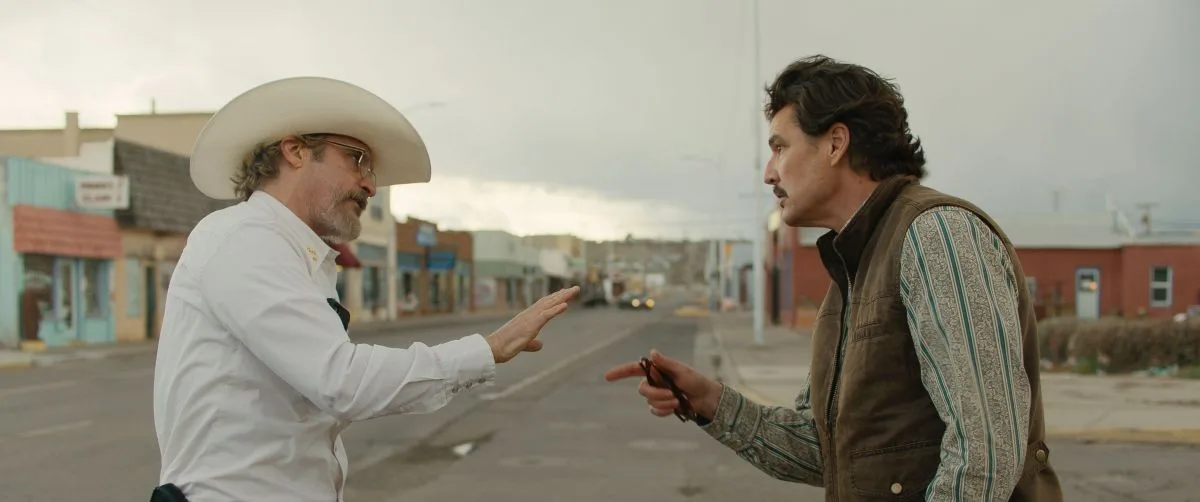
Is it too soon to make a movie about those early, surreal days of the COVID-19 pandemic? Having seen Ari Aster’s ambitious, if muddled Eddington, I can only say: maybe?
Lord knows he gets lots of the details right. The anti-maskers who insist they can’t breathe with a mask on. Those geniuses who wore masks but didn’t cover their noses. The six-feet distance rule that no one could quite measure correctly. The endless Zoom meetings and videoblogs. The long lines at testing centers and those draconian giant Q-tips they would shove up our noses to get samples. The constant flaring of tempers. And, of course, the outbreak of conspiracy theories (it’s biological warfare! It’s the Chinese! It’s the Russians! It’s Bill Gates!) that began to metastasize, auguring the conspiracy rich world that we are living in today. In one scene, I noticed several rolls of toilet paper neatly stacked on the floor of a character’s home. Aster doesn’t call attention to this cultural relic. It’s just there.
And of course, COVID wasn’t the only thing making America sick around that time—George Floyd was murdered by a police officer in Minneapolis and Black Lives Matter protests sprung up across the country. Everything felt het up, precarious, volatile.
Aster captures this time perfectly. What he doesn’t do, as least as far as I could tell, is give us a unifying theory of all this, something insightful and provocative to chew on. Instead, the movie has a, “That was totally nuts, huh?” quality. (On the other hand, perhaps that’s the only reasonable response to 2020.)
The film’s action takes place in the small New Mexico town of Eddington. Joe Cross (Joaquin Phoenix) is the anti-masker sheriff. Ted Garcia (Pedro Pascal) is the “woke” mayor. Well, I should say, ostensibly woke. He may believe in masks and science but he seems perfectly happy to let a giant, energy sucking technology center start building in the center of town.
Aster has called his film a western of sorts, and the fact that these two men hate each other and often have to face off in nearly vacant streets six-feet apart from each other (no weapons in sight—yet) does contribute to that sense. Social distancing at the O.K. Corral.
While we see a bit of Ted’s home life—his wife left him and he’s raising a mildly rebellious teenage son on his own—the film mostly follows Joe’s journey. At the start of COVID, his bonkers mother-in-law, Dawn (Deidre O’Connell), moved in with him and his sad-sack wife, Louise (Emma Stone). Joe loves Louise with all his heart—it’s his most redeeming quality—but she’s drifting away, falling further and further down the conspiracy rabbit holes her mother introduces her to. And he loses her completely when she falls under the spell of a handsome would-be cult leader (Austin Butler) who spreads fevered tales of secret pedophile rings.
Early in the film, Joe decides he’s going to run for mayor and he festoons his sheriff’s truck with flags and anti-lockdown slogans with questionable spelling (“Your being manipulated”) and photos of Ted Garcia that read: “Get this virus out of office.”
At this point, Joe only has two employees left in his sheriff’s office: Guy (Luke Grimes), who is white, and Michael (Micheal Ward), who is Black. Guy insists that before the Black Lives Matter protest came to town, he barely noticed that Michael was Black. But now he can’t help but wonder whose side he’s really on. (So yes, Aster even nails those “Black Lives Matter made me racist” types, too.)
In the spirit of equal opportunity satirizing, I was amused by how Aster makes fun of the self-righteous teens who protest Floyd’s death while sheepishly apologizing for their own whiteness. “We need to shut up and listen to Black people!” yells one white boy to a crowd of BLM protesters. “Which I will do… right after making this speech! Which, uh, I have no right to give because I’m standing on stolen ground!”
That said, I was a bit puzzled by his introduction of Antifa late in the film. Instead of gently mocking the far right’s vision of Antifa as some sort of militant, ubiquitous force, he seems to buy into it. (It’s parody, sure, but hits differently from the other bits of parody that were so spot-on.) Just for the record, I should note that the final third of the film is extremely violent—like, Tarantino violent.
I can’t say I actually enjoyed Eddington—although I don’t think that was what Aster was going for. He wants us to feel uncomfortable (he succeeds) and he wants us to reflect on the craziness that we collectively experienced. I buy into the “tragedy plus time equals comedy” formula. But maybe not enough time has passed. And the fact that things today feel similarly unhinged doesn’t help matters. If you’re stuck in the middle of a cyclone, do you really need a movie that says, “Hey, remember the early days of this cyclone? Those were wild.”
